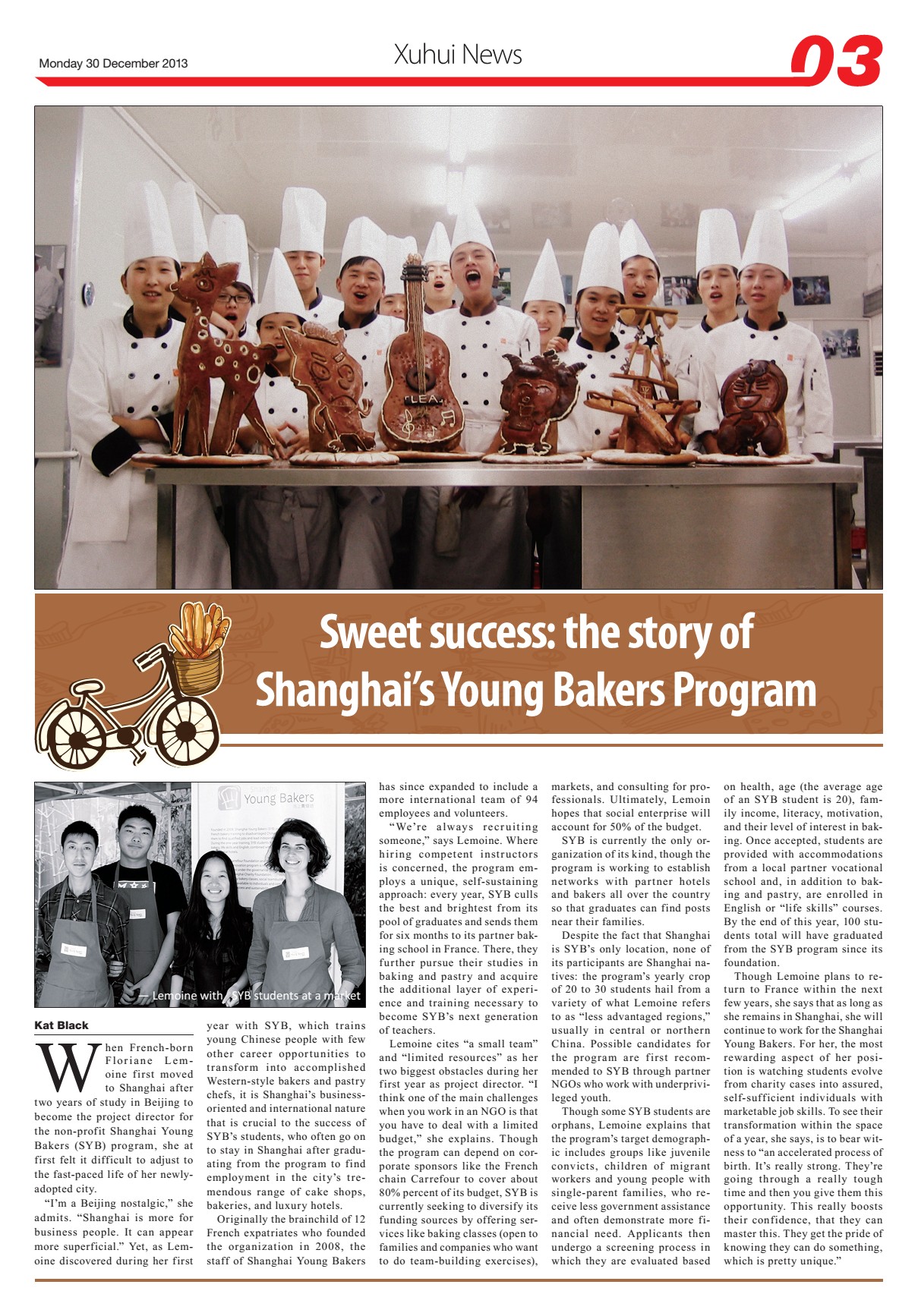
Xuhui News: “Sweet Success: The story of Shanghai Young Bakers program”
By Kat Black
When French-born Floriane Lemoine first moved to Shanghai after two years of study in Beijing to become the project director for the non-profit Shanghai Young Bakers (SYB) program, she at first felt it difficult to adjust to the fast-paced life of her newly-adopted city.
“I’m a Beijing nostalgic,” she admits. “Shanghai is more for business people. It can appear more superficial.” Yet, as Lemoine discovered during her first year with SYB, which trains young Chinese people with few other career opportunities to transform into accomplished Western-style bakers and pastry chefs, it is Shanghai’s business oriented and international nature that is crucial to the success of SYB’s students, who often go on to stay in Shanghai after graduating from the program to find employment in the city’s tremendous range of cake shops, bakeries, and luxury hotels.
Originally the brainchild of 12 French expatriates who founded the organization in 2008, the staff of Shanghai Young Bakers has since expanded to include a more international team of 94 employees and volunteers. [Rectification: 94 is the number of SYB graduates as of end of 2013, SYB works with a much smaller but committed team of 10, plus volunteers]
“We’re always recruiting someone,” says Lemoine. Where hiring competent instructors is concerned, the program employs a unique, self-sustaining approach: every year, SYB culls the best and brightest from its pool of graduates and sends them for six months to its partner baking school in France. There, they further pursue their studies in baking and pastry and acquire the additional layer of experience and training necessary to become SYB’s next generation of teachers.
Lemoine cites “a small team” and “limited resources” as her two biggest obstacles during her first year as project director. “I think one of the main challenges when you work in an NGO is that you have to deal with a limited budget,” she explains. Though the program can depend on corporate sponsors like the French chain Carrefour to cover about 80% percent of its budget, SYB is currently seeking to diversify its funding sources by offering services like baking classes (open to families and companies who want to do team-building exercises), markets, and consulting for professionals. Ultimately, Lemoine hopes that social enterprise will account for 50% of the budget.
SYB is currently the only organization of its kind, though the program is working to establish networks with partner hotels and bakers all over the country so that graduates can find posts near their families.
Despite the fact that Shanghai is SYB’s only location, none of its participants are Shanghai natives: the program’s yearly crop of 20 to 30 students hail from a variety of what Lemoine refers to as “less advantaged regions,” usually in central or northern China. Possible candidates for the program are first recommended to SYB through partner NGOs who work with underprivileged youth.
Though some SYB students are orphans, Lemoine explains that the program’s target demographic
includes groups like juvenile convicts [N.B: it is actually children of convicts, they have committed no criminal offense themselves but suffer from exclusion and discrimination], children of migrant workers and young people with single-parent families, who receive less government assistance and often demonstrate more financial need. Applicants then undergo a screening process in which they are evaluated based on health, age (the average age of an SYB student is 20), family income, literacy, motivation, and their level of interest in baking. Once accepted, students are provided with accommodations from a local partner vocational school and, in addition to baking and pastry, are enrolled in English or “life skills” courses. By the end of this year, 100 students total will have graduated from the SYB program since its foundation.
Though Lemoine plans to return to France within the next few years, she says that as long as she remains in Shanghai, she will continue to work for the Shanghai Young Bakers. For her, the most rewarding aspect of her position is watching students evolve from charity cases into assured, self-sufficient individuals with marketable job skills. To see their transformation within the space of a year, she says, is to bear witness to “an accelerated process of birth. It’s really strong. They’re going through a really tough time and then you give them this opportunity. This really boosts their confidence, that they can master this. They get the pride of knowing they can do something, which is pretty unique.”
《徐汇报》:甜蜜的成长:海上青焙坊的故事
经历两年在北京的学习之后,出生于法国的林兰搬到了上海,担任公益组织海上青焙坊(SYB)的项目总监。她对这座新城市的快节奏生活感到一时难以适应。
“我很想念北京。”林兰说道,“上海更适合生意人,更加光鲜亮丽。”然而,在海上青焙坊工作了一年后,她发现了上海的妙处。SYB是一个致力于把缺乏就业机会的中国年轻人训练成为出色的西式烘焙师与糕点主厨的项目。正是上海的商业导向与国际化对SYB学生的成功起到决定性作用,因为他们中的大部分在从这个项目毕业之后将继续留在上海,在这个城市大量的蛋糕店、烘焙房和高级酒店中找到一份工作。
这个组织最初由12名在中国的法籍雇员发起并在2008年建立。至今,海上青焙坊已经成长为一个更加国际化的团队,共有94名员工和志愿者[更正:94是截止至2013年海上青焙坊的毕业生数,海上青焙坊现有10名工作人员,另加200余名志愿者]。
林兰说:“我们一直在招收新的员工。”由于SYB项目非常重视雇佣有竞争力的教师,它采用了一个独特的、赖以自立的方法:每年,SYB选出最优秀最聪明的毕业生,送他们到位于法国的合作烘焙学校进行六个月的进修。在那里他们将进一步学习烘焙糕点的技术,更重要的是获得更多的经验与培训,最终成长为SYB新一代的教师。
林兰说,在她担任项目主管的第一年里,“小团队”和“有限的资源”成为了她最大的两个障碍。她解释说,“我觉得有限的预算是在NGO工作的一个主要挑战。”尽管法国连锁超市家乐福等企业赞助商提供了80%的预算,海上青焙坊现阶段还是在积极寻找其他收入来源,比如烘焙课程(开放给家庭以及企业团队活动),周末集市,以及专业咨询。林兰的最终目的是希望社会企业型收入能支持预算中的50%。
目前,海上青焙坊是唯一一个同类组织,不过海上青焙坊正在努力与全国各地的酒店和烘焙坊建立合作伙伴关系,以便让青焙坊毕业的学生能在家乡附近找到工作。
尽管海上青焙坊只在上海一个地方有办公室,青焙坊的学生们都并非上海本地人。每年,海上青焙坊项目接收20至30位来自不同地区的学生,通常来自华中或华北,根据林兰的说法,也就是“欠发达地区”。这些候选人是由致力于帮助贫困青年的NGO合作伙伴首先推荐给海上青焙坊的。
林兰解释说,SYB的学员除了孤儿之外,也会有失足少年[编者注:海上青焙坊的学员并不包括失足少年,他们实际上是罪犯的孩子,他们自身并没有犯罪,却成为了社会上的边缘人]、外来务工人员子女、单亲家庭子女等其他经济拮据又无法得到政府足够帮助的青少年。SYB会从健康状况、年龄(SYB平均学员年龄为20岁)、家庭收入情况、文化程度、学习动机和对烘焙的热情等方面测评筛选学员,一旦被录取,学员将被安排寄宿在上海的合作学校接受烘焙课程以及英语课程等其他一些生活技能课程的学习。在今年年底,SYB的毕业生总数将达到100人。
虽然林兰将要在几年后回到法国,但是她说,她在上海多久,她就会为SYB工作多久。对她而言这份工作最值得的地方就是看着学生们在一年内从帮扶对象蜕变为有工作技能、自给自足的人。她说:“这种成长就像快进一样。他们曾经遭受苦难,然后我们给予了他们一个改变的机会让他们自信,让他们知道自己能做好一件并非人人都能做的事,并为自己的能力感到骄傲。”
(感谢蔡悦盈、许瀞云、Zoe Zhang的翻译)

